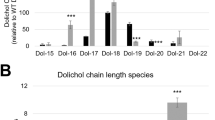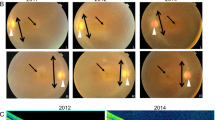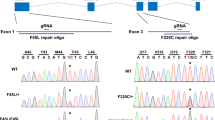Abstract
Mutation of a receptor tyrosine kinase gene, Mertk, in the Royal College of Surgeons (RCS) rat1 results in defective phagocytosis of photoreceptor outer segments by the retinal pigment epithelium (RPE) and retinal degeneration2,3,4,5,6,7,8,9. We screened the human orthologue, MERTK, located at 2q14.1 (ref. 10), in 328 DNA samples from individuals with various retinal dystrophies and found three mutations in three individuals with retinitis pigmentosa (RP). Our findings are the first conclusive evidence implicating the RPE phagocytosis pathway in human retinal disease.
This is a preview of subscription content, access via your institution
Access options
Subscribe to this journal
Receive 12 print issues and online access
$209.00 per year
only $17.42 per issue
Buy this article
- Purchase on Springer Link
- Instant access to full article PDF
Prices may be subject to local taxes which are calculated during checkout

Similar content being viewed by others
References
D'Cruz, P.M. et al. Hum. Mol. Genet. 9, 645–652 (2000).
Bourne, M.C., Campbell, D.A. & Tansley, K. Br. J. Ophthalmol. 22, 613–622 (1938).
Bourne, M.C. & Gruneberg, H. J. Hered. 30, 130–136 (1939).
Mullen, R.J. & LaVail, M.M. Science 192, 799–801 (1976).
Dowling, J.E. & Sidman, R.L. J. Cell Biol. 14, 73–109 (1962).
Young, R.W. & Bok, D. J. Cell Biol. 42, 392–403 (1969).
Herron, W.L., Riegel, B.W., Myers, O.E. & Rubin, M.L. Invest. Ophthalmol. 8, 595–604 (1969).
Bok, D. & Hall, M.O. J. Cell Biol. 49, 664–682 (1971).
Edwards, R.B. & Szamier, R.B. Science 197, 1001–1003 (1977).
Weier, H.U., Fung, J. & Lersch, R.A. Cytogenet. Cell Genet. 84, 91–92 (1999).
Graham, D.K., Dawson, T.L., Mullaney, D.L., Snodgrass, H.R. & Earp, H.S. Cell Growth Differ. 5, 647–657 (1994).
Bunge, S., Fuchs, S. & Gal, A. Methods in Molecular Genetics (ed. Adolf, K.W.) 26–39 (Academic, Orlando, Florida, 1996).
Nickerson, D. et al. Nature Genet. 19, 233–240 (1998).
Faktorovich, E.G., Steinberg, R.H., Yasumura, D., Matthes, M.T. & LaVail, M.M. Nature 347, 83–86 (1990).
Li, L. & Turner, J.E. Exp. Eye Res. 47, 911–917 (1988).
Acknowledgements
We thank the patients for participation and E. de Castro for help. This work was supported by grants from Foundation Fighting Blindness (A.G., S.G.J.), Deutsche Forschungsgemeinschaft (A.G., E.A.-S.), British Retinitis Pigmentosa Society (A.G., D.A.T.), March of Dimes Birth Defects Foundation (D.V.), Ruth and Milton Steinbach Fund (D.V.), Dr. Lubert Stryer (D.V.), NIH (S.G.J.), Daniel Matzkin Research Fund (S.G.J.) and Research to Prevent Blindness (D.A.T.).
Author information
Authors and Affiliations
Corresponding author
Rights and permissions
About this article
Cite this article
Gal, A., Li, Y., Thompson, D. et al. Mutations in MERTK, the human orthologue of the RCS rat retinal dystrophy gene, cause retinitis pigmentosa. Nat Genet 26, 270–271 (2000). https://doi.org/10.1038/81555
Issue Date:
DOI: https://doi.org/10.1038/81555
This article is cited by
-
GMP-grade human neural progenitors delivered subretinally protect vision in rat model of retinal degeneration and survive in minipigs
Journal of Translational Medicine (2023)
-
Unravelling the genetic basis of retinal dystrophies in Pakistani consanguineous families
BMC Ophthalmology (2023)
-
Therapeutic targeting of the functionally elusive TAM receptor family
Nature Reviews Drug Discovery (2023)
-
TAM family kinases as therapeutic targets at the interface of cancer and immunity
Nature Reviews Clinical Oncology (2023)
-
Intravenous infusion of small umbilical cord mesenchymal stem cells could enhance safety and delay retinal degeneration in RCS rats
BMC Ophthalmology (2022)



